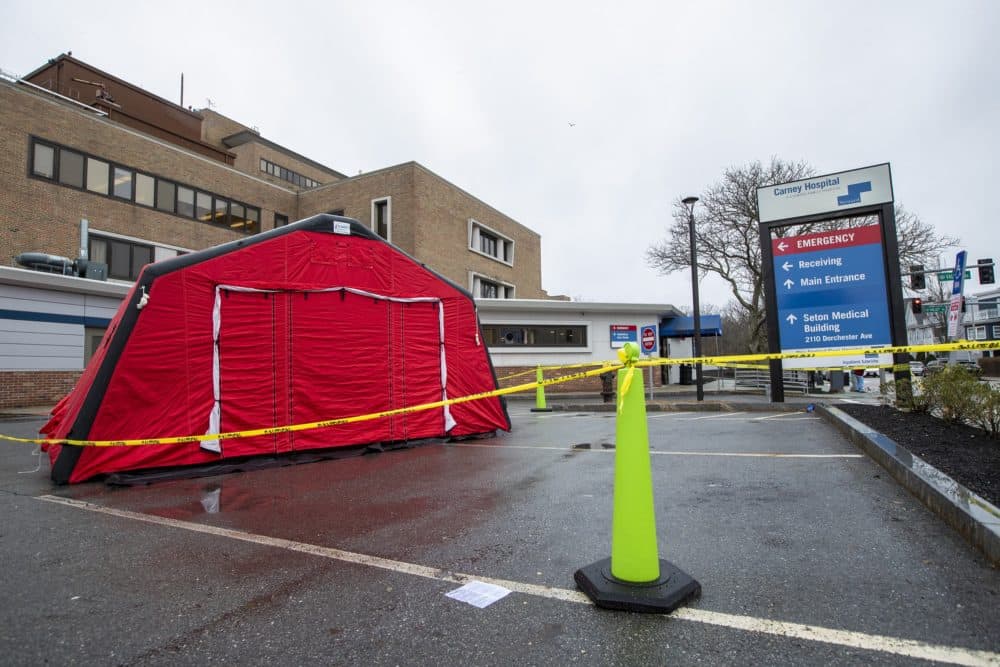Advertisement
Underused Facilities, Like Dorchester's Carney Hospital, May Provide Vital Space To Treat Coronavirus

Steward Health Care plans to send patients with the coronavirus to Dorchester's Carney Hospital, creating a designated treatment center that’s equipped to prevent the virus from spreading to new, uninfected people inside the facility.
The for-profit health system has touted the center as the first of its kind in the country.
So far, the hospital has dedicated 11 beds to the illness, but that might soon change.
“The 11-bed unit is just the start," says Dr. Joseph Weinstein, the chief medical officer of Steward Health Care. "We do have the ability and capacity to increase by opening up additional units in Carney Hospital.”
Carney currently operates 159 beds, but the hospital sprawls over roughly 282,000 square feet – enough room for hundreds more. If the coronavirus spreads rapidly through Boston, infecting a large swath of the population, all of that space may be vital to treating some of the worst cases, says Bill Walczak, a former president of Carney Hospital.
“If things go the way the infectious disease doctors say they’re going to go, we’re going to be desperate for as many beds as we can get,” he says. “There’s lots of space inside the Carney Hospital to retrofit for people that need hospitalization because of COVID-19.”
Drawing patients with the coronavirus to Carney may also provide a temporary boost to the hospital’s cash flow. The hospital, like other community hospitals around Boston, has shrunk and struggled financially for years. Steward, the hospital's parent company, closed nearby Quincy Medical Center in 2014, leaving only a satellite emergency department, operated by Carney Hospital.
“The reality is Carney is a community hospital in greater Boston, [a place] where people go to major teaching hospitals for care," Walczak says. "As a result, it’s been harder and harder for Boston to sustain community hospitals. But in reality, community hospitals can do a lot of what happens in major teaching hospitals. Retrofitting for this new need makes a lot of sense, financially, as well as for public health.”
Carney may not be the only hospital in the region that could be called to serve this purpose, Walczak says. If the hospital fills up with COVID-19 patients, Steward says it will designate more units in its other Massachusetts hospitals to fight the pandemic.
Beyond Steward, other currently unused facilities might also be drafted into action, Walczak says.
“If we’re going to have additional beds for a great need for COVID-19 patients, we’ll have to retrofit hospitals that have closed," he says.
But this will take time.
At Carney Hospital, the rooms dedicated to treating COVID-19 patients will be modified with devices that prevent air – and the virus – from escaping to other parts of the hospital. This helps make the designated coronavirus treatment center a safer environment both for other patients in the hospital and the medical staff, according to Steward Health Care.
“Essentially, we need to put a vacuum on each room, then have that air filtered and exhausted,” says Weinstein.
Healthcare workers must also don protective gear – like gloves, masks, face shields, and gowns – before entering the unit’s hallway. There’s another space for staff to safely remove the gear before leaving.
Steward Health Care is also moving safety equipment and transferring doctors, nurses and other health workers to Carney Hospital from its other Massachusetts facilities to bolster the new treatment center.
“I think we’re gearing up for a once in a lifetime pandemic,” Weinstein says. "We're prepared for the worst but hoping for the best.
This article was originally published on March 17, 2020.
